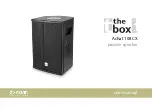
ENGLISH
13
SMOKER TEMPERATURE RANGES
Temperature readouts on the control board may not exactly match the thermometer. All temperatures listed below
are approximate and are affected by the following factors: outside ambient temperature, the amount and direction
of wind, the quality of pellet fuel being used, the cabinet door being opened, and the quantity of food being cooked.
•
HIGH TEMPERATURE (190-215°C / 375-420°F)
This range is used to grill at high heat, without any contact with flame. High temperature is also used as the burn-off
temperature to clean off the cooking grids after use. Additionally, high heat can be used in extreme cold weather conditions to
compensate for the contrast of temperatures between outside and inside the unit.
•
MEDIUM TEMPERATURE (135-177°C / 275-350°F)
This range is best for baking, roasting, and finishing off that slow smoked creation. Cooking at these temperatures will
greatly reduce the chances of a grease flare-up. Great range for cooking anything wrapped in bacon, or where you want
versatility with control.
•
LOW TEMPERATURE (65-122°C / 150-250°F)
This range is used to slow roast, increase smoky flavor, and to keep foods warm. Infuse more smoke flavor and keep your
meats juicy by cooking longer at a lower temperature (also known as
low and slow
). Highly recommended for the big turkey
at Thanksgiving, juicy ham at Easter, or the huge holiday feast.
Smoking is a variation on true barbecuing and is truly the main advantage of a smoker. There are two types of smoking: hot
smoking and cold smoking.
•
Hot smoking
, another name for
low and slow
cooking, is generally done at 65-122oC / 150-250oF. Hot smoking
works best when longer cooking time is required, such as large cuts of meats, fish, or poultry.
•
Cold smoking
is when the food is located so far away from the fire that it smokes without cooking, and at
temperatures of 15-32oC / 60-90oF.
TIP: To intensify that savory flavor, switch to SMOKE (low) temperature range immediately after putting your food
on the smoker. This allows the smoke to penetrate the meats, before the pores of the meat close at 49°C / 120°F.
The key is to experiment with the length of time you allow for smoking, before the meal is finished cooking. Some outdoor chefs
prefer to smoke at the end of a cook, allowing the food to keep warm until ready to serve. Practice makes perfect!














































